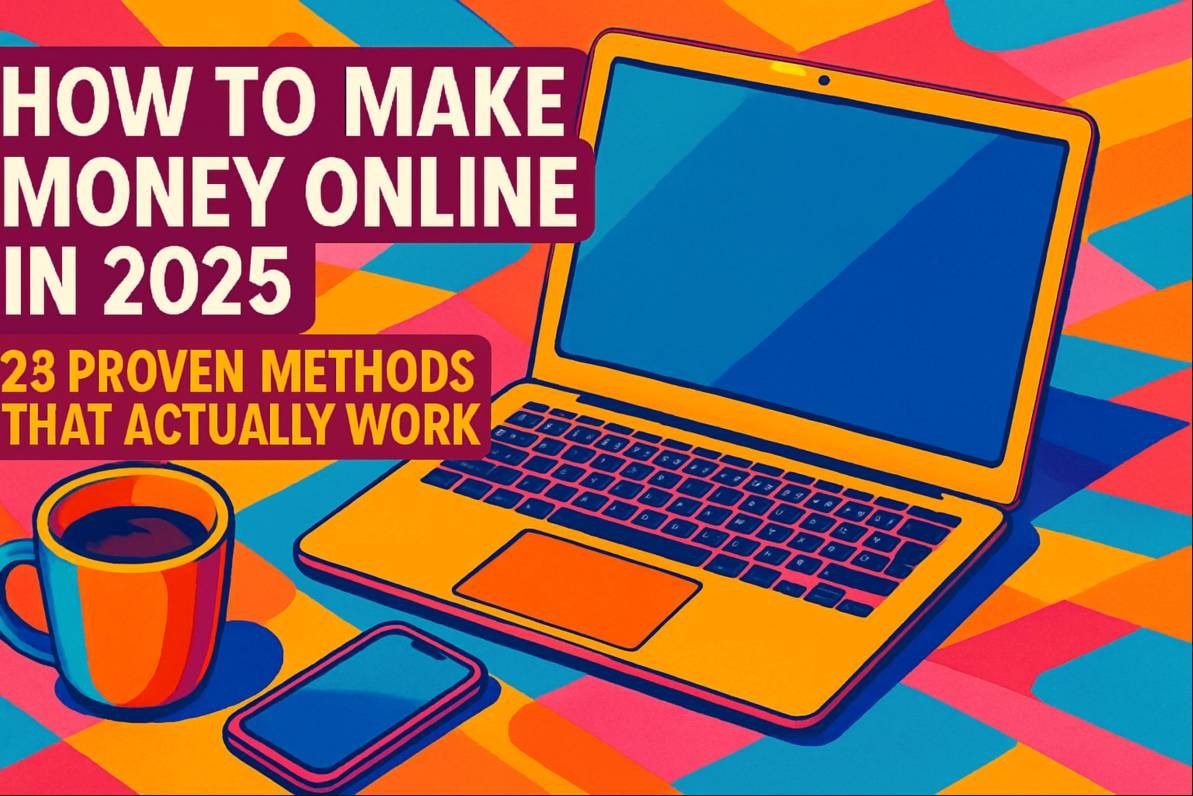Let me guess.
You’re tired of your 9-to-5 job, or maybe you’re looking for ways to supplement your income. You’ve probably seen those flashy ads promising you can “make $10,000 in 30 days” with some secret method.
Here’s the truth: Most of those are complete garbage.
But making money online? That’s absolutely real and achievable.
I’ve been making money online for over a decade. I’ve tested dozens of methods, failed spectacularly at some, and succeeded beyond my wildest dreams with others. Today, I’m going to share everything I’ve learned—the good, the bad, and the realistic expectations.
By the end of this post, you’ll have a clear roadmap to start generating income online, whether you want to make an extra $500 per month or build a six-figure business.
The Reality Check You Need Before We Start
Before I dive into the strategies, let me destroy some myths that are probably floating around in your head:
Myth #1: “You can make thousands overnight”
Reality: Building sustainable online income takes time. Most successful people I know took 6-12 months to see meaningful results.
Myth #2: “You need special skills or a degree”
Reality: Many of the highest earners online started with basic skills and learned as they went.
Myth #3: “You need lots of money to start”
Reality: Most methods I’ll share cost less than $100 to start, and many are completely free.
Myth #4: “Passive income means no work”
Reality: Even “passive” income requires upfront work and ongoing maintenance.
Now that we’ve cleared that up, let’s dive into the real strategies.
Quick-Start Methods: Start Earning This Week
1. Online Surveys and Microtasks
I know what you’re thinking: “Surveys? Really?”
Look, I’m not saying you’ll get rich from surveys, but they’re legitimate and you can start immediately.
How it works:
Companies need consumer feedback, and they’re willing to pay for it. You answer questions, test websites, or complete small tasks.
Best platforms:
- Swagbucks: Earn $5-50 per survey
- UserTesting: $10-60 per website test
- Prolific: Higher-paying academic surveys ($6-12/hour)
- Amazon Mechanical Turk: Various microtasks
Realistic earnings: $200-800 per month with consistent effort
My experience: I made $347 in my first month with Swagbucks while watching Netflix. Not life-changing, but it covered my grocery bill.
Pro tip: Focus on UserTesting and Prolific for better hourly rates. Skip the platforms that pay in “points”—your time is worth real money.
2. Freelancing: Monetize Your Existing Skills
This is where things get interesting. Whatever skill you have—writing, design, programming, social media, even organizing—someone will pay for it.
Popular freelance services:
- Content writing ($15-100+ per article)
- Graphic design ($25-200+ per project)
- Virtual assistance ($10-25 per hour)
- Social media management ($300-2,000+ per month per client)
- Web development ($50-150+ per hour)
Where to find clients:
- Upwork: Largest marketplace, competitive
- Fiverr: Fixed-price services, good for beginners
- Freelancer.com: Project-based work
- LinkedIn: Direct outreach to businesses
- Facebook groups: Industry-specific communities
My student Sarah’s story: She started offering Pinterest management services on Fiverr for $25. Within 6 months, she was charging $1,500 per month per client and had a waiting list.
Getting started:
- List 5 skills you already have
- Check what people are charging for similar services
- Create profiles on 2-3 platforms
- Start with lower prices to build reviews
- Gradually increase your rates as you gain experience
3. Sell Your Photos and Videos
Got a smartphone? You can make money with your photos.
How it works: Stock photography sites pay for high-quality, commercial-use images and videos.
Best platforms:
- Shutterstock: $0.25-120 per download
- Getty Images: Premium payouts for accepted work
- Unsplash+: Growing platform with good rates
- Adobe Stock: Part of Creative Cloud ecosystem
What sells:
- Business and technology themes
- People in everyday situations
- Food and lifestyle shots
- Nature and travel photos
- Abstract backgrounds and textures
Realistic expectations: $100-1,000+ monthly after building a portfolio of 500+ images.
Content Creation: Build an Audience, Build Income
4. Start a Blog That Actually Makes Money
Blogging changed my life, and it can change yours too.
Why blogging still works in 2025:
- Search engines drive consistent, targeted traffic
- Multiple monetization options
- You own your audience (unlike social media)
- Compounds over time—old posts continue generating income
My proven blog monetization formula:
Phase 1 (Months 1-6): Foundation
- Choose a specific niche (personal finance for millennials, not just “finance”)
- Publish 2-3 high-quality posts per week
- Build an email list from day one
- Focus on solving real problems
Phase 2 (Months 7-12): Monetization
- Affiliate marketing (promote products you actually use)
- Display ads (Google AdSense, then Mediavine/AdThrive)
- Sponsored content (brands pay you to write about their products)
Phase 3 (Year 2+): Scaling
- Create digital products (courses, ebooks, templates)
- Offer services (consulting, coaching)
- Build multiple income streams
Real numbers from my blogs:
- Month 6: $500/month
- Month 12: $3,200/month
- Month 18: $8,500/month
- Month 24: $15,000+/month
Getting started:
- Choose your niche (be specific)
- Set up WordPress with good hosting
- Write your first 10 posts
- Start promoting on social media
- Join relevant online communities
5. YouTube: The Video Gold Rush
YouTube isn’t just for entertainment—it’s a legitimate business platform.
How YouTubers make money:
- Ad revenue: $1-5 per 1,000 views (varies by niche)
- Sponsorships: $500-50,000+ per video (depending on audience size)
- Affiliate marketing: Promote products in video descriptions
- Channel memberships: Recurring revenue from subscribers
- Merchandise: Sell branded products
Niches that work well:
- Educational content (how-tos, tutorials)
- Product reviews and unboxings
- Personal finance and investing
- Fitness and health
- Technology and gaming
My friend Jake’s success story: He started a personal finance YouTube channel with his phone camera. 18 months later, he’s earning $12,000/month and quit his corporate job.
Getting started:
- Pick a niche you’re passionate about
- Invest in good audio (more important than video quality)
- Be consistent—upload weekly at minimum
- Study successful channels in your niche
- Engage with your audience in comments
6. Newsletter Monetization
Email marketing is making a comeback in a big way.
Why newsletters work:
- Direct access to your audience
- Higher engagement than social media
- Multiple monetization options
- You own the relationship
Popular newsletter platforms:
- Substack: Built-in payment processing for paid subscriptions
- ConvertKit: Advanced automation features
- Mailchimp: Good free tier for beginners
Monetization strategies:
- Paid subscriptions ($5-50/month)
- Sponsored newsletter sections
- Affiliate product recommendations
- Selling your own products/services
Case study: Morning Brew started as a simple business newsletter and sold for $75 million. While that’s exceptional, many newsletter creators earn $1,000-10,000+ monthly.
E-commerce and Digital Products: Build Your Online Store
7. Dropshipping: Sell Without Inventory
Dropshipping gets a bad rap, but done right, it can be profitable.
How it works: You sell products online, but the supplier ships directly to your customer. You never handle the inventory.
Pros:
- Low startup costs ($100-500)
- No inventory management
- Location independent
- Scalable
Cons:
- High competition
- Lower profit margins (15-30%)
- Customer service challenges
- Platform dependence
Keys to success:
- Find unique products or underserved markets
- Focus on customer service and marketing
- Build a brand, don’t just flip products
- Test products before scaling
Platforms to use:
- Shopify: Most popular, easy to use
- WooCommerce: WordPress integration
- Oberlo/Spocket: Product sourcing
8. Print-on-Demand: Your Designs, Their Production
Love creating designs? Print-on-demand might be perfect for you.
How it works: You create designs, upload them to platforms, and they handle printing and shipping when someone orders.
Popular platforms:
- Printful: Integrates with Shopify, Etsy
- Teespring: Built-in marketplace
- Society6: Art-focused community
- Redbubble: Large existing customer base
What to design:
- Funny or inspirational quotes
- Niche hobby designs
- Pop culture references (be careful with copyrights)
- Minimalist artwork
Realistic earnings: $500-5,000+ monthly with successful designs
Success tip: Research trending topics and create designs quickly. The first to market often wins.
9. Digital Products: The Ultimate Passive Income
This is where the real money is. Digital products have 80-95% profit margins.
Types of digital products:
- Ebooks ($9-99): Compile your knowledge into downloadable guides
- Online courses ($97-2,997): Teach skills through video lessons
- Templates ($19-199): Business plans, social media templates, resumes
- Software/apps ($29-299/month): Solve specific problems with tools
- Stock photos/graphics ($1-50 each): For marketers and businesses
My digital product success:
I created a social media course for $497. After 6 months:
- 847 sales = $421,559 in revenue
- Cost to create: About 60 hours of work
- Ongoing effort: 2-3 hours per week for customer support
Getting started:
- Identify a problem you can solve
- Create a minimum viable product (MVP)
- Test with a small audience
- Refine based on feedback
- Scale your marketing
Service-Based Online Businesses: Sell Your Expertise
10. Online Tutoring and Teaching
The online education market is exploding. If you know something, you can teach it.
Subjects in demand:
- English (especially for non-native speakers)
- Programming and tech skills
- Business and marketing
- Music and arts
- Academic subjects (math, science, etc.)
Platforms to use:
- Preply: Language learning focus ($10-40/hour)
- iTalki: Language exchange and lessons
- Wyzant: Academic tutoring ($30-80/hour)
- Cambly: Conversational English ($10-12/hour)
- Teachable: Create your own course platform
My experience: I taught digital marketing on weekends for $75/hour. Within 3 months, I was booked solid and raised my rate to $125/hour.
11. Consulting and Coaching
Got professional experience? Turn it into a consulting business.
Popular consulting niches:
- Marketing and advertising
- Business strategy
- Financial planning
- Career coaching
- Health and fitness
- Relationship coaching
How to get started:
- Define your expertise clearly
- Create case studies from past experience
- Build a simple website
- Network in your industry
- Start with friends and colleagues
Pricing strategies:
- Beginner: $50-100/hour
- Experienced: $150-300/hour
- Expert: $300-1,000+/hour
- Packages: $2,000-10,000+ for comprehensive projects
12. Virtual Assistant Services
Businesses need help with administrative tasks, and they’re willing to pay for it.
Services virtual assistants offer:
- Email management and customer service
- Social media management
- Data entry and research
- Content creation and writing
- Project management
- Bookkeeping and accounting
Where to find clients:
- Belay: VA agency with good training
- Time Etc: UK-based VA company
- Fancy Hands: Task-based work
- Direct outreach: Contact businesses directly
Earning potential: $15-50+ per hour depending on skills and experience.
Advanced Strategies: Scale to Six Figures
13. Affiliate Marketing: The Long Game
Affiliate marketing isn’t quick money, but done right, it’s incredibly lucrative.
How it works: You promote other people’s products and earn commissions on sales.
High-paying affiliate niches:
- Software/SaaS: $50-500+ per sale
- Financial services: $50-1,000+ per lead
- Education/courses: $100-1,500+ per sale
- Health supplements: $20-200+ per sale
My affiliate marketing formula:
- Choose products you actually use and love
- Create helpful content around the problems they solve
- Build trust before promoting anything
- Use multiple content formats (blog, video, email)
- Track everything and optimize
Real example: I promote a $297 course that pays 50% commission. I make about 10 sales per month = $1,485 monthly recurring income from one product.
14. Create and Sell Online Courses
Online learning is a $325 billion industry. Here’s your piece of it.
Course creation process:
- Validate your idea: Survey your audience about their biggest challenges
- Create a curriculum: Break your knowledge into digestible modules
- Record content: Use screen recording software and a decent microphone
- Build your course: Use platforms like Teachable, Thinkific, or Kajabi
- Launch and promote: Email list, social media, partnerships
Pricing strategies:
- Mini-courses: $47-97
- Comprehensive courses: $197-997
- Premium/certified programs: $1,997-4,997+
Success factors:
- Solve a specific, painful problem
- Include actionable steps and templates
- Provide ongoing support and community
- Get testimonials and case studies
15. Build a SaaS (Software as a Service) Business
This is advanced, but the potential is enormous.
SaaS advantages:
- Monthly recurring revenue
- Scalable business model
- High customer lifetime value
- Location independent
SaaS ideas for beginners:
- Simple productivity tools
- Industry-specific calculators
- Social media management tools
- Niche community platforms
No-code tools to use:
- Bubble: Visual programming platform
- Webflow: For web applications
- Zapier: Automation tools
- Airtable: Database applications
Reality check: SaaS is hard. Most fail. But those that succeed can generate $10,000-100,000+ monthly.
The Secret Websites and Platforms Most People Don’t Know About
16. Specialized Platforms That Pay Well
Rev.com: Transcription services ($15-22/audio hour)
Respondent.io: Market research participation ($50-750 per study)
Usertesting.com: Website and app testing ($10-60 per test)
Tester.io: Mobile app testing ($10-50 per test)
Enroll.com: Online focus groups ($50-300 per session)
17. Creative Platforms
99designs: Graphic design contests ($200-800+ per winning design)
Voices.com: Voice-over work ($100-1,000+ per project)
Fiverr: Unique services marketplace
Creative Market: Sell design assets and templates
Setting Realistic Income Expectations
Let me give you realistic timelines based on different methods:
Month 1-3: Learning and Setup
- Surveys/microtasks: $200-500
- Freelancing (beginner): $300-1,000
- Content creation: $0-200
Month 4-6: Building Momentum
- Established freelancer: $1,000-3,000
- Blog with monetization: $200-1,000
- YouTube partner: $100-800
- Digital product launch: $500-5,000
Month 7-12: Consistent Income
- Multiple income streams: $2,000-8,000
- Successful course creator: $3,000-15,000
- Established consultant: $5,000-20,000
Year 2+: Scaling
- Successful online business: $10,000-50,000+
- Multiple digital products: $15,000-100,000+
- SaaS business: $5,000-500,000+
The Action Plan: What to Do Right Now
Week 1: Assessment and Quick Wins
- List your current skills and knowledge
- Sign up for 2-3 survey/microtask platforms
- Create profiles on Upwork and Fiverr
- Start earning immediately with what you know
Week 2-4: Choose Your Path
- Based on your skills and interests, pick 1-2 main strategies
- Set up necessary accounts and profiles
- Create your first content or complete your first projects
- Start building an email list
Month 2-3: Double Down
- Focus on your most promising income stream
- Reinvest earnings into tools and education
- Start building relationships in your niche
- Track everything and optimize
Common Mistakes That Kill Online Income
Mistake #1: Shiny Object Syndrome
Jumping from method to method without giving any one strategy enough time to work.
Mistake #2: Underpricing Yourself
Your time and skills have value. Don’t work for pennies.
Mistake #3: Not Building an Email List
Social media platforms can disappear or change their algorithms. Your email list is yours forever.
Mistake #4: Focusing Only on Money
The most successful online entrepreneurs focus on providing value first. Money follows value.
Mistake #5: Giving Up Too Soon
Most people quit right before breakthrough. Persistence separates winners from quitters.
The Truth About “Passive Income”
Let me be brutally honest: There’s no such thing as truly passive income.
Even the most “passive” income streams require:
- Initial time investment to set up
- Ongoing maintenance and updates
- Customer service and support
- Marketing and promotion
- Continuous learning and adaptation
What people call “passive income” is really “leveraged income”—you do the work once and get paid multiple times.
Red Flags: What to Avoid
Avoid anything that:
- Promises specific income amounts (“Make $5,000 in 30 days guaranteed”)
- Requires large upfront payments with vague promises
- Uses pressure tactics (“Limited time offer, act now!”)
- Has no clear business model or value proposition
- Focuses on recruiting others rather than selling products/services
Remember: If it sounds too good to be true, it probably is.
Your Next Steps
Here’s exactly what I want you to do:
Today:
- Choose one quick-start method and begin
- Set up accounts on relevant platforms
- Complete your first task or create your first profile
This Week:
- Earn your first dollar online (even if it’s just $5)
- Research one long-term strategy that interests you
- Start building an email list
This Month:
- Focus on one main income stream
- Set a realistic income goal
- Track your progress and adjust
This Quarter:
- Scale what’s working
- Eliminate what’s not
- Plan your next income stream
Final Thoughts: The Mindset That Makes or Breaks Success
Making money online isn’t about finding the perfect opportunity—it’s about becoming the type of person who creates opportunities.
The most successful people I know share these traits:
- Persistence: They don’t give up when things get tough
- Adaptability: They adjust their strategies based on results
- Value focus: They always ask “How can I help people?”
- Learning mindset: They continuously improve their skills
- Systems thinking: They build processes that scale
Remember, making money online is a skill like any other. The more you practice, the better you get.
Start today, stay consistent, and be patient with the process. Your future self will thank you.
The internet has created more millionaires than any other innovation in human history. There’s absolutely no reason you can’t be one of them.
What’s stopping you? Start now.
Suggested reads: How to Start a Blog for Beginners 2025: Your Complete Step-by-Step Guide


